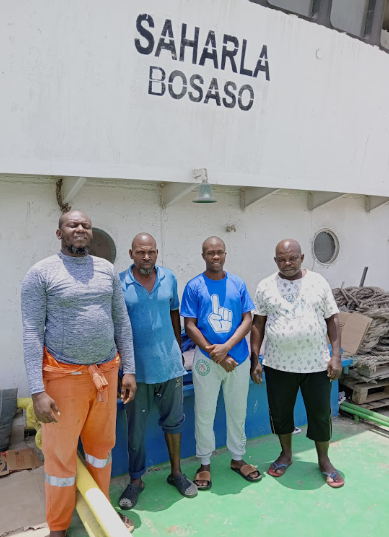Four Kenyan seafarers are stranded at Port Duqm in Oman aboard the fishing vessel FV Saharla. The ship owner reportedly abandoned the crew in March after the vessel encountered mechanical problems.
Although the ship was taken to a dry dock for repairs, the owner failed to cover the repair charges and other related port fees.
“We have been stranded here in Oman. The ship owes the port and the agency a lot of money. We are in seven months arrears, going into the eighth month,” one of the stranded seafarers, Mwamba Nuru said in an audio recording via WhatsApp.
The other crew members are Abdulrahman Idd, Mwalimu Omar and Tela Juma.
Two Tanzanians and four Somali nationals make the rest of the team.
The seafarers were employed last year on a contractual basis and have been operating along the Arabian Sea fishing grounds since March.
They are running out of fuel, freshwater supply and ship stores (equipment and supplies necessary for the operation, navigation and maintenance of a vessel).
The fishing vessel is owned and managed by TG Blue Treasure Seafood Inc, based in Bossaso Port, Somalia and bears the country’s flag.
Their efforts to obtain help from agencies have not borne fruit.
“We have reported to International Transport Workers’ Federation and the Kenyan embassy here in Oman,” Nuru said.
The Embassy has written to the Kenyan Ministry of Foreign Affairs to assist in repatriating them.
“The Kenyan Embassy in Oman said they do not have money for our air tickets back home. They have asked us to call our families in Kenya to send us air tickets,” Juma said.
Seafarer Union of Kenya secretary general, Atie Swaleh, confirmed receiving the distress call.
“We have written to the Maritime Principal Secretary, Labour Principal Secretary and ITF to help these crew members to be brought back home. We have a challenge that they are not our members, but we will still help them to come back,” Swaleh said.
Kenya has 5,000 seafarers working on foreign vessels, although most are not members of SUK. Andrew Mwangura, a veteran seafarer and maritime consultant, emphasized that the Somali government bears responsibility in such cases.
“The primary obligation of the flag state in cases of abandonment involving both the crew and the ship is to ensure the safety and welfare of the crew and address the implications of the abandoned ship while upholding maritime safety and environmental protection standards,” Mwangura stated.
In an interview with the Star, Mwangura added, “This includes facilitating repatriation, ensuring access to medical care, and addressing immediate humanitarian needs.”
Mwangura, who has been in contact with the stranded Kenyans, noted that the employer must continue paying the crew members. “The ship owner is responsible for arranging and covering the costs associated with repatriating the crew members to their home countries,” he said.
Entitlements owed according to their employment contracts should be provided until the crew members are safely repatriated or alternative arrangements are made. Shipowners should also maintain regular communication with the crew, their families, and relevant authorities to provide updates and ensure necessary support.
“The ship owner may also be liable for any damages suffered by the crew due to the abandonment and may need to provide compensation,” he added. “The shipowner must adhere to International Maritime Labour conventions and regulations governing the treatment of seafarers, including those related to abandonment.”



